
Advancing the Science on Recovery Community Centers

Allison Futter, B.S. — Alli is a Clinical Research Coordinator for the Health through Flourishing (HtF) Research Program at , Massachusetts General Hospital (MGH). She graduated summa cum laude from Trinity College, CT with a B.S. Honors in Psychology and a minor in Cognitive Science. Alli works on several projects for the Health through Flourishing lab, including a NIH-funded R21 grant testing a smoking cessation mobile-health app for smokers living with HIV and a R01 randomized control trial for a smoking cessation app using a positive psychology framework. She hopes to continue building her research career by pursing either a MS or PhD in Clinical Psychology. Her research interests include positive psychology, harm reduction models, and using biopsychosocial-spiritual models to understand addictive behaviors.

I am an Associate Professor in Psychology at Harvard Medical School, Director of the Health through Flourishing Program (HtF) within the Massachusetts General Hospital (MGH)’s Department of Psychiatry, and core faculty of the Health Promotion and Resiliency Intervention Research (HPRIR) Center, a joint initiative between the MGH Mongan Institute and the MGH Department of Psychiatry to harness the strengths of interdisciplinary behavioral science delivery research. By training, I am an experimental psychologist focusing on substance use disorder research. The broad aim of my program of research is to increase access to care, especially for underserved, stigmatized and marginalized populations. The type of ‘care’ I specialize in is the auxiliary support people could access outside of the formal treatment setting; care that could support and extend the care they receive in a clinical setting. To this end, I have taken two approaches: (1) my research examines, builds and tests mHealth approaches to support people as they transition away from substance use; and (2) my research elucidates mechanisms by which community resources (e.g., mutual help, recovery community centers) can be leveraged to support recovery from substance use disorder.

Lauren A. Hoffman, PhD is an Assistant Professor of Psychology in the Department of Psychiatry at Harvard Medical School, and a Research Scientist at the Recovery Research Institute within the Center for Addiction Medicine at Massachusetts General Hospital. Her current research is funded by the National Institute on Drug Abuse (NIDA), and seeks to elucidate the biopsychosocial correlates of successful substance use disorder treatment and recovery, with an emphasis on opioid use disorder and translation to real-world populations. The ultimate goal of her research is to leverage identified biological and psychosocial correlates to develop and test novel interventions that more effectively address barriers to successful treatment and sustained recovery. In addition to her research activities, Dr. Hoffman serves as Chair of the Nominations and Elections Committee for the American Psychological Association’s Society of Addiction Psychology, a member of the NIDA Consortium on Addiction Recovery Science, as well as a member of the Recovery Outcomes Institute research group.
Dr. Hoffman received her Bachelor of Arts from San Diego State University with honors in Psychology. She received her MS and PhD in Psychology with an emphasis in Behavioral and Cognitive Neuroscience from the University of Florida. She completed her post-doctoral training at the Recovery Research Institute, as a Research Fellow in Addiction Medicine within the Department of Psychiatry at Massachusetts General Hospital and Harvard Medical School.

Scientist, Alcohol Research Group, a project of the Public Health Institute
She focuses on addiction health services research, highlighting the gaps in the substance use treatment delivery system and examining innovative approaches to increase access to and improve the quality and availability of substance use treatment and recovery support services. In addition to leading her own studies and collaborating with other ARG scientists on theirs, she also serves on the PHI IRB and the Board of Directors for the National Alliance for Recovery Residences.

Jon Picard, B.S. is the IT Manager at Faces & Voices of Recovery and manages the Recovery Data Platform (RDP). RDP is a cloud based electronic recovery platform that is utilized by Recovery Community Centers and Organizations across the country. Jon started his journey in recovery data in November 2019 at the Maine Recovery HUB at the Portland Recovery Community Center as a Data Analyst. He transitioned to Faces & Voices of Recovery in April 2021 to expand his knowledge of recovery data by working with a national organization focused on recovery advocacy, training, and data. Recovery data tells the story on the individual, the local community, and nationally and Jon is grateful for the opportunity to assist RCCs and RCOs in all aspects of recovery metrics. Jon is not only a data geek, but a recovery geek too. He has been in recovery from a substance use disorder since May 2016.

fpullen@lets-talk-safety.orgamericle@arg.org
Dr. Felecia Pullen is a qualitative researcher with expertise in applying Critical Race Theory to understand the impact of systemic and structural racism on people of color. She also designs integrated conceptual models to explore the intersection of race, structural racism, and addiction among people of color who use drugs (PoCWUD). She aims to establish political, social, economic, and health equity for PoCWUD. Her seminal work in the field has been recognized by OASAS, SAMHSA, the CDC, the New York City Dept. of Health & Mental Hygiene, and Mt.
Sinai/REACH. She has been deemed one of America’s most noted racial justice and equity experts, activists, and advocates.
Dr. Pullen’s influence extends beyond her research. She is the mastermind behind the Mixed Method Recovery Capital Assessment Tool (MRCAT), a digitized product
that has revolutionized the standardization of recovery and negative recovery capital measurement. This ground-breaking tool, an organic extension of her research, has been hailed by Peers and industry leaders as the gold standard for recovery capital assessment, a testament to the impact of her work.
Dr. P.’s expertise, advocacy, and activism have made her one of the most sought-after keynotes. She has delivered numerous presentations on health equity, Peer engagement, racial justice and harm reduction, racialized drug policies, and the intersection of structural racism and addiction of PoCWUD, and she has advised other researchers on Cultural and Racial Responsivity. Due to her recognition in the field, she was twice appointed by NYC Mayors Bill DeBlasio and Eric Adams to New York City’s Municipal Drug Strategy Council and holds an executive position on the FOR-NY and Let’s Talk SAFETY boards of directors.
Dr. Pullen’s commitment to social change is not limited to her research and tool development. As the founder, President & CEO of The PILLARS and SAFE in Harlem, she spearheads financial growth, organizational structure, and program development. As a policy analyst, she leverages her expertise to champion financial equity for small not-for-profits and health equity for people of color, a testament to her dedication to making a tangible difference in the lives of those she serves.

Philip Rutherford is Vice President, Substance Use Continuum at The National Council for Mental Wellbeing. Rutherford has managed strategy and operations for several recovery-focused organizations. He is a member of committees at the National Institutes of Health, the Food and Drug Administration and other federal agencies. He serves as board chair for Serve Minnesota and the Police Treatment and Community Collaborative. He also holds board seats at the National Association of Addiction Treatment Providers and the Recovery Policy Collaborative. In 2020 Rutherford launched Black Faces Black Voices, a community-focused collaborative centering the needs of Black communities. This group now represents roughly 100 organizations around the country. Prior to the nonprofit world, he spent most of his career at Microsoft, Micron Electronics, and the Taylor Corporation. Rutherford is an active member of the recovery community and has considerable experience in the areas of reentry and equity.

acwilliamson@mgh.harvard.eduamericle@arg.org
Alivia Williamson is a Clinical Research Coordinator at the Health through Flourishing lab. She recently graduated with honors from Boston University where she received a B.A. in Psychology.
Alivia is currently working on multiple projects in the HtF lab, such as the R24 initiative to advance the science on recovery community centers (RCCs) and the R34 studies looking at RCCs that primarily serve Black populations. Her research interests include restorative justice, transformative justice, prison abolition, liberation psychology, and forensic psychology. She plans to continue her career in research by pursuing a Ph.D. in Clinical Psychology with a concentration in Forensics.
Collaborative Hub for Emerging Adult Recovery Research

Angela Hagaman (DrPH, MA, NCC) is the Co-Director of the East Tennessee State University Addiction Science Center. In this role she provides leadership and support for the Center’s interdisciplinary research agenda and collaborates on a number of regional prevention and treatment initiatives. Dr. Hagaman currently serves as the Program Director for the NIDA-funded Studies to Advance Recovery Supports (STARS/R24DA051973), Co-investigator on the Collaborative Hub for Emerging Adult Recovery Research (CHEARR/R24DA057632), and Co-investigator for the CoARS supplement (Consortium on Addiction Recovery Science/R24DA051946). Dr. Hagaman also received formal mentoring and training through the Justice Involved and Emerging Adult Populations training institute (JEAP/R24DA051950).

Dr. Lourah Kelly is an incoming Assistant Professor at UMass Chan Medical School in Worcester, MA after successfully completing her postdoctoral research at UConn School of Medicine. She is Co-Investigator on CHEARR (Collaborative Hub for Emerging Adult Recovery Research; PI: Zajac) and is passionate about understanding what recovery supports work best for emerging adults who have been particularly hard-hit by the opioid epidemic and tends to have higher rates of co-occurring mental health disorders and suicide risk compared to older age groups. Dr. Kelly’s overall program of research focused on co-occurring alcohol and other drug use problems and suicide risk among adolescents and emerging adults, as well as technology-based interventions for these two problems. She was awarded a K99/R00 Pathway to Independence Award which provided mentorship and advanced training to support her research on developing and evaluating a technology intervention for emerging adults with alcohol use problems and suicidal thoughts for delivery in the emergency department. She is also a Co-Investigator on Dr. Becker’s MERIT (Method to Extend Research in Time) award, and provides supervision and clinical support for an effectiveness trial testing Parent SMART, a technology-assisted intervention for parents of adolescents in residential substance use treatment.

lalewis@uchc.edu
Lauren Lewis recently earned her Ph.D. in
Addictive Disorders and Recovery Studies from
Texas Tech University and currently serves as a
CHEARR postdoctoral fellow. Her career began
as a Licensed Addiction Counselor in Colorado,
where she worked closely with individuals facing
substance use challenges and those in recovery.
This experience inspired her commitment to
person-centered and community-driven
research. Lauren aims to enhance our
understanding of recovery across diverse
backgrounds and pathways through high-quality
research and collaborative efforts.

Ashli J. Sheidow (she/her), a Senior Research Scientist at OSLC, researches treatments for mental health and substance use problems in teens and emerging adults, particularly those who are involved in the legal system. She’s also focused on effective ways to get evidence-based practices into the “real world,” especially through improving training and support for community-based providers. While she does not have direct lived experience, she has indirect lived experience with substance use problems throughout multiple generations of her extended family that began with opiate addiction from laudanum prescribed postpartum to her great-grandmother.

sylwhite@uchc.edu
Sylvia White holds a Bachelor of Science
from the University of Connecticut and is
currently pursuing a Master of Public
Health at UConn Health. Her
commitment to advancing recovery
research is deeply rooted in her lived
experience with a parent who struggled
with opioid use disorder from his early
adulthood. Additionally, during her
undergraduate years, she volunteered
for an addictive medicine outreach
group. The profound impact of her lived
experience has influenced her passion
for the field personally, academically,
and professionally.

Kristyn Zajac is a licensed clinical psychologist and Associate Professor at the University of Connecticut School of Medicine. She received her PhD in clinical psychology from the University of Delaware and completed her predoctoral internship and postdoctoral fellowship at the Medical University of South Carolina’s National Crime Victims Center. She is the Principal Investigator of the Collaborative Hub for Emerging Adult Recovery Research (CHEARR), which aims to advance the research on recovery support services, particularly clinical continuing care models, for emerging adults who take or who have taken medications for opioid use disorder. Dr. Zajac conducts clinical trials research on behavioral interventions to improve treatment outcomes for youth with substance use and co-occurring problems. Her recent work focuses on the efficacy of peer recovery specialists in supporting young adults to meet their substance use treatment goals.
Family Involvement in Recovery Support and Treatment

Kammarauche Aneni, MBBS, MHS is an Assistant Professor of Child Psychiatry and of Biomedical Informatics and Data Science at the Yale School of Medicine. She is also the PI of the ACCESS Lab at the Yale Child Study Center. Her research focuses on preventing the initiation and worsening of substance misuse among adolescents by specifically investigating how digital technology can improve access to care, assess high-risk behaviors/symptoms, and deliver culturally informed interventions. Dr. Aneni also cares for adolescents who misuse substances and delivers mental health treatments to them and their families.
Link to Yale profile: Kammarauche Aneni, MBBS, MHS < Yale School of Medicine
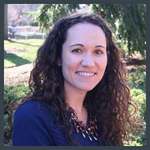
Dr. Becker (she/her) is a licensed clinical psychologist and implementation scientist dedicated to bridging the gap between research and practice. Dr. Becker studies both patient-focused dissemination (e.g., direct-to-consumer marketing, technology-assisted interventions) and provider-focused implementation (e.g., multi-level implementation approaches, workforce development) strategies. The overarching objective of her work is to increase both the demand for and supply of effective treatments in community settings.
Dr. Becker is currently Principal Investigator (PI) of several federally-funded dissemination and implementation (D&I) projects. First, with Bryan Garner, she is Multiple PI of a 5-year NIDA-funded R01 hybrid type 3 trial evaluating two multi-level strategies to implement contingency management, an evidence-based behavioral treatment, in 30 opioid treatment centers throughout New England. Second, with Caroline Kuo and Goodman Sibeko, she is Multiple PI of a 5-year NIAAA-funded P01 testing a train-the-trainer strategy to cascade Screening, Brief Intervention, and Referral to Treatment targeting risky alcohol use throughout HIV service organizations in South Africa. Third, she is PI of the New England Addiction Technology Transfer Center, a SAMHSA-funded center which provides training and technical assistance to over 2,100 front-line addiction treatment providers per year. Finally, she is PI of a NIDA funded R37 (awarded as an R01), which is supporting a pragmatic trial of a scalable technology-assisted intervention for parents of adolescents in residential treatment. The R37 mechansim denotes receipt of a Method to Extend Research in Time (MERIT) Award, which provides “long-term grant support to investigators whose research competence and productivity are distinctly superior and who are highly likely to continue to perform in an outstanding manner.” Dr. Becker was honored to be the first implementation scientist to receive this award from NIDA.
To date, Dr. Becker has been PI/MPI or Scientific Lead of nine federally funded projects from NIDA, NIAAA, NIGMS, PEPFAR, SAMHSA, and AHRQ. In addition to leading her own research portfolio, Dr. Becker frequently enjoys serving as a Mentor, Co-Investigator, or Consultant on D&I projects.
Dr. Becker’s work has been honored with two national awards from the Association for Behavioral and Cognitive Therapies (ABCT): Early Career Award from the Dissemination and Implementation Science Special Interest Group in 2018 and the Mid-Career Award from the Addictive Behaviors Special Interest Group in 2020. At the Brown School of Public Health, she received the Faculty Innovations Award in 2015 and the Excellence in Research Collaboration Award in 2021.
Dr. Becker received her Ph.D. in Clinical Psychology from Duke University. She completed her residency at Harvard Medical School’s McLean Hospital and her postdoctoral fellowship at Brown University’s Center for Alcohol and Addictions Studies. Prior to her graduate work, Dr. Becker worked as a strategy consultant with Boston Consulting Group and Mapi Values, where she advised Fortune 100 companies on direct-to-consumer marketing and organizational change strategies.

Molly Bobek supports the clinical components of the Family and Adolescent Clinical Technology & Science (FACTS) team’s research projects aiming to support the adoption and sustainability of evidence-based family therapy approaches, develop novel approaches to training and consultation, and better equip and support the community-based workforce treating adolescent substance use and other externalizing problems. Molly is also on the faculty at the Ackerman Institute for the Family and maintains a private practice working with families and individuals. She is a graduate of The College of the Holy Cross and received her master’s degree in social work, concentrating in clinical practice from Hunter College School of Social Work.

jessica.calihan@childrens.harvard.edu
Dr. Jessie Calihan is a current adolescent medicine fellow with the Boston Children’s Hospital Division of Adolescent and Young Adult Medicine. She attended medical school at Columbia College of Physicians & Surgeons before completing the Urban Health Internal Medicine-Pediatrics residency at Johns Hopkins Hospital and a pediatric addiction medicine fellowship with the Boston Children’s Hospital Adolescent Substance Use and Addiction Program (ASAP). She is interested in intersections of adolescent health, substance use, and childhood trauma and plans to focus her career on improving health equity through working with adolescents and families affected by substance use.

Jessica Chou is a family therapy and Assistant Professor in the College of Nursing and Health Professions at Drexel University. She aims to understand how to best meet the needs of women with substance use disorders (SUDs), their children, and families. As a result, she partners with community-based substance use treatment centers region to identify factors related to prevention, treatment, and recovery support. Current projects in her lab focus on family therapy utilization in treatment centers, stigma and medication for opioid use, and family functioning and recovery outcomes. She has secured local and national funding for the development, implementation and evaluation of substance use programming for women and their families.

mfishman@marylandtreatment.org
Marc Fishman, M.D. leads Maryland Treatment Centers / Mountain Manor, a regional behavioral healthcare provider, which offers programs for residential and outpatient SUD and co-occurring treatment for youth and adults. He is an addiction psychiatrist and member of the faculty at Johns Hopkins University School of Medicine. His academic and research work has focused on addiction pharmacotherapy; models of care for youth, particularly with OUD; and treatment placement and matching strategies. Dr. Fishman served as a co-editor for the most recent editions of the ASAM Criteria for the Treatment of Substance-Related Disorders. He served as a past President (2010-12) of the Maryland Society of Addiction Medicine, and is a current member of its Board.

Craig Henderson, Ph.D. is Professor of Psychology at Sam Houston State University. He is a Counseling Psychologist who received his doctorate from the University of North Texas in 2000, followed by a National Research Service Award Postdoctoral Fellowship at the University of Miami. His research interests involve the application of data analytic methods to address substantive research topics in the areas of family involvement in youth substance use treatment and recovery services, effectiveness of evidence-based family therapy interventions usual care settings, and fidelity and implementation research on evidence-based practices for youth behavioral health issues. His methodological expertise includes multilevel modeling, latent growth curve modeling, tests, of moderation and mediation in a structural equation modeling framework, mixture modeling, and item response theory.

Aaron Hogue, Ph.D., is a Clinical Psychologist focused on evidence-based practices for adolescent substance use and related behavioral problems, behavioral treatment implementation science, and adolescent developmental psychopathology.
Dr. Hogue’s 25-year research program on treatment fidelity to research-based interventions for adolescent substance use has examined the interplay among three components of treatment implementation — adherence to specific therapy techniques, competence in model delivery, and therapeutic alliance with session participants— linking each to long-term client outcomes. His research encompasses evidence-based interventions for adolescents with Attention-Deficit/Hyperactivity Disorder and co-occurring disorders, including a NIDA-funded mid-career training grant focused on combined behavioral and pharmacological interventions.
Dr. Hogue was chosen by the flagship journal for Clinical Child Psychology to lead their 2014 and 2018 updates of the evidence base on outpatient behavioral treatments for adolescent substance use. His current research focuses on training front-line behavior therapists in core family therapy and cognitive-behavioral techniques for adolescent conduct and substance use problems via a learning management system that leverages observational coding methods and fidelity measurement feedback. He also focuses on increasing family involvement across the continuum of care for substance use treatment and recovery services, as well as enhancing cross-sector care for youth with conduct and substance problems in primary care, specialty behavioral care, and juvenile justice settings.
Research topics: Development of family-based and cognitive-behavioral interventions for adolescent substance use and co-occurring disorders; development of online and other remote clinician training methods; research on family-based recovery supports; treatment fidelity research on evidence-based intervention models; combined behavioral and pharmacological interventions for teens with co-occurring ADHD and substance use disorder; neurodevelopmental processes that influence risky adolescent behavior

sharon.levy@childrens.harvard.edu
Sharon Levy, M.D., M.P.H. is a Developmental-Behavioral Pediatrician, Addiction Medicine specialist, Director of the Adolescent Substance Use and Addiction Program at Boston Children’s Hospital and Associate Professor at Harvard Medical School. Over the past 20 years she has evaluated and treated thousands of adolescents with substance use disorders, and she has written extensively on the topic. In 2016 she established the nation’s first accredited Pediatric Addiction Medicine Fellowship training program. She has expertise in the integration of substance use treatment services into pediatric primary care.

Dr. Samuel Meisel received his doctorate in clinical psychology from the University at Buffalo, the State University of New York in 2020. He completed his clinical residency at the Alpert Warren Medical School of Brown University. Dr. Meisel is a NIAAA K99 funded postdoctoral fellow at Bradley Hospital and Brown University’s Center for Alcohol and Addiction Studies. His research, rooted in developmental psychopathology, seeks to better understand how relationships with friends and caregivers relate to adolescent substance use initiation, escalation, and treatment. By exploring teenagers’ relationships with their friends and parents, Dr. Meisel hopes to refine and strengthen substance use interventions to better address these social processes that impact prevention and treatment outcomes. Alongside his research, Dr. Meisel is passionate about working with families with adolescents who struggle with substance use and have co-occurring mental health diagnoses. He is currently a clinician and clinical supervisor at Bradley Vista. Beginning July 2024, Dr. Meisel will join the faculty at Boston University as a tenure-track assistant professor of clinical psychology in the Department of Psychological and Brain Sciences.

Dr. Ijeoma Opara is an Assistant Professor in the Department of Social & Behavioral Sciences at Yale School of Public Health. Dr. Opara is also the founding director of The Substance Abuse and Sexual Health (SASH) Lab (www.oparalab.org). Dr. Opara defines herself as a community-based participatory researcher with experience in working with youth and community organizations dedicated to reducing substance use in urban communities. Dr. Opara’s prior experience involves working as a doctoral fellow for a SAMHSA/Drug Free Communities grant that was based in Paterson, New Jersey. Dr. Opara has received training and funding to conduct her work from the National Institute on Drug Abuse, National Institute of Mental Health, Substance Abuse & Mental Health Services Administration and Centers for Disease Control & Prevention. Most recently, Dr. Opara received the 2020 NIH Director’s Early Independence Award which will fund a five-year youth substance use prevention and mental health community-based study in Paterson, NJ. Dr. Opara received her Ph.D. in Family Science & Human Development from Montclair State University, a Master of Social Work from New York University, a Master of Public Health from New York Medical College and a Bachelor of Arts in Psychology from New Jersey City University.

Nicole Porter is a post-doctoral fellow in clinical psychology at McLean Hospital, Harvard Medical School working with teens and their families in a residential DBT treatment program and conducting program evaluation research. She received her doctorate in clinical psychology from St. John’s University, where she studies clinical research, assessment and intervention for adolescents and families. Her research interests include leveraging empirical research and technology to disseminate evidence-based family therapy treatment for adolescent behavior problems in routine care.

Dr. Lindsey Rodriguez is an Associate Professor of Psychology at the University of Florida. As the Director of the Health-based Education for Alcohol and Relationships Treatment (HEART) Laboratory, her research bridges social and clinical psychology and focuses on the intersection of close relationships, personality, mental health, and health behaviors such as alcohol, marijuana, opiates, and gambling. Her work strives to ultimately develop and evaluate brief interventions in these domains, focusing on self-reinforcing patterns that result in sustained behavior change. Other constructs include intimate partner violence, emotion regulation, personality, attachment, and expressive writing.

Kevin Wenzel, Ph.D., is Director of Research at Maryland Treatment Centers, a Maryland-based regional behavioral healthcare organization specializing in treatment for substance use disorder and co-occurring mental illness. He received his doctorate from Saint Louis University in 2016 and is a licensed psychologist. His research interests include identifying and developing effective treatments for addictions and related concerns with a special emphasis on cognitive behavioral approaches and family involvement to enhance treatment outcomes for opioid addiction in young people.

fsummersettringgold@luriechildrens.org
Faith Summersett Williams, PhD, is an Assistant Professor in Pediatrics at Northwestern University Feinberg School of Medicine. More specifically, she is trained as a pediatric psychologist, and currently works as an implementation scientist in the Potocsnak Division of Adolescent and Young Adult Medicine at Ann & Robert H. Lurie Children’s Hospital where she leads the research program for the Substance Use and Prevention Program. Her academic and clinical interests are focused on health equity and justice to center the values and needs of historically marginalized communities. She combines this perspective with implementation and dissemination science frameworks to examine health inequities in relation to structural disenfranchisement with the goal of reducing inequities in healthcare delivery.
Her current research is focused on scaling up evidence-based behavioral health interventions in clinical and community health settings. Through her research she hopes to serve a particularly vulnerable pediatric population – youth with chronic medical conditions who are at high-risk for secondary alcohol and substance use disorders. Dr. Summerset Williams is dedicated to establishing a universal standard of equitable healthcare for communities on the periphery. Her interest in studying and addressing alcohol and substance use in adolescents, especially among those with chronic illness, came about due to her deep awareness of the role substances often play as a driver of poor and inequitable health outcomes.
Innovations in Recovery through Infrastructure Support

Jodi Jacobson Frey, PhD, LCSW-C, CEAP is a Full Professor with tenure and Associate Dean for Research at the University of Maryland, School of Social Work. Dr. Frey chairs the Social Work in the Workplace & Employee Assistance Sub-specialization (formerly EAP Sub-specialization) is the Founder and Faculty Executive Director of the recently launched Behavioral Health and Well-Being Lab (BHWell Lab). Between 2011-2022, she chaired the Financial Social Work Initiative and remains active as a member of the Steering Committee. Her MSW and PhD degrees were earned from the University of Maryland. She is also co-Chair of the University of Maryland Mental Health and Addiction Health Disparities Think Tank at the School of Medicine.
Frey’s research focuses on workplace behavioral health, including the impact of employee mental health and well-being, and substance use on productivity and safety. She studies the effectiveness of employee assistance, work/life, and related programs for working-aged adults and families. She has dedicated a significant portion of her research and advocacy work to suicide prevention, mental health, substance use and recovery and the intersection with the workplace with attention to social determinants of health and well-being.
Frey co-chairs the Workplace Suicide Prevention and Postvention Committee where she is contributing as a leader in the development and dissemination of the National Guidelines for Workplace Suicide Prevention. She is past chair of EAPA’s Subcommittee on Workplace Disaster Preparedness and Response. In 2006, Dr. Frey was the recipient of the EAPA President’s Award for Excellence, recognizing her work on this committee. Prior to joining academia full-time, Dr. Frey provided workplace mental health and EAP services to NASA, Goddard Space Flight Center, where she was recognized with several awards for her service to employees and family members. She continues to fuel her passion for workplace behavioral health and support for working families through her research, teaching and service to the social work profession.
Recent refereed articles have been published in JAMA, American Journal of Addictions, Social Work, Journal of Career Development, Journal of Occupational and Environmental Medicine, Research on Social Work Practice, and Suicide and Life-Threatening Behavior. Dr. Frey regularly presents her research at national and international conferences. She is the Co-Editor-in-Chief for the Journal of Workplace Behavioral Health. Dr. Frey also co-founded the International Employee Assistance Digital Archive, housed at the University of Maryland, and which was awarded the Best Use of Technology in the Employee Assistance Field by the Employee Assistance Professionals Association (EAPA) in 2019. Dr. Frey was recently awarded Educator of the Year by the National Association of Social Workers, Maryland.
Frey resides in Maryland with her husband and two sons. She enjoys running and being with her family in free time.
Centers, Organizations, and Programs:
– Affiliated faculty at Yonsei University School of Social Welfare, Seoul, South Korea
– Co-Editor in Chief, Journal of Workplace Behavioral Health
– Co-Founder, International Employee Assistance Digital Archive
– Co-Chair, Workplace Suicide Prevention and Postvention Committee
Expertise and Interests:
– Adult and Emerging Adult Behavioral Health
– Workplace Behavioral Health and Well-Being
– Suicide Prevention and Crisis Intervention
– Opioid Use, Recovery and Broader Substance Use
– Employee Assistance, Workplace Mental Health and Well-Being
– Working Families
– Social Determinants of Health
– Financial Capability and Asset Building

Expertise and Interests:
– Environmental impacts on mental health
– Ecotherapy
– Environmental justice
– Behavioral health service systems
– Mental health crisis response and stabilization
– Telemedicine interventions for vulnerable populations
– Program evaluation
– Ecosocial work education

Erika Shook is the Public Relations Specialist for IRIS at the University of Maryland School of Social Work. Erika creates and manages strategic communications for the project. She also manages the website and social media. Outside of IRIS, Erika also works on projects based on mental health, suicide prevention and adult behavioral health. While she is professionally trained in advertising and public relations, she uses her knowledge of communications to create effective messaging around opioid recovery research and building equitable community-academic partnerships for IRIS. Erika is also currently studying for a Master of Public Health with a focus on epidemiology at the University of Maryland School of Medicine.


Expertise and Interests:
– Social and Psychiatric Epidemiology
– Psychiatric Diagnosis
– Health Consequences of Heroin Use
– Organization and Financing of Mental Health Services
– Mental Health Outcome Measurement

fernando.wagner@ssw.umaryland.edu
Dr. Fernando A. Wagner is a professor at the University of Maryland School of Social Work. He is interested in the development of methods, knowledge, and community-based participatory interventions promoting wellness and public mental health and has led research in the US and Mexico for over 35 years. Dr. Wagner earned his Doctor of Science degree from the Johns Hopkins School of Public Health (Mental Hygiene, 1999), where he also completed a year of postdoctoral training in psychiatric epidemiology (2000), and a Master of Public Health (1993). He has received important awards, such as the Hubert H. Humphrey Fellowship (1992-93), the Morton Kramer Award (Johns Hopkins University, 1998), the WHO/CPDD/NIDA International Award (2002); as well Faculty of the Year (2007,) Investigator of the Year (2008), and the Golden Apple Award (2010) during his tenure at Morgan State University from 2002 to 2017. Inducted to the National Public Health Honor Society (2007), he is the first author or coauthor in prestigious scientific journals such as the American Journal of Public Health, Neuropsychopharmacology, the American Journal of Epidemiology, Drug and Alcohol Dependence, Addictions, and Preventive Medicine.
Dr. Wagner is a member of the following professional organizations:
– College of Problems of Drug Dependence
– American Public Health Association
– Maryland Public Health Association
– National Hispanic Science Network
Expertise and Interests:
– Development of Methods
– Community-participatory Interventions Promoting Wellness and Public Mental Health
Infrastructure for Studying Treatment and Recovery Residences

Project Co-Investigator
Professor of Psychology, DePaul University
Director, Center for Community Research
Dr. Jason is a former president of the Division of Community Psychology of the American Psychological Association. Jason has edited or written 30 books, and he has published over 900 articles and 100 book chapters. He has served on the editorial boards of ten psychological journals. Dr. Jason has served on review committees of the National Institutes of Health, and he has received over $47,700,000 in federal research grants. Since the early 1990s, his group has been studying the effectiveness of Oxford House recovery homes using multiple methods, as well as trying to understand the dynamic processes accounting for change.

Project Coordinator, Alcohol Research Group, a program of the Public Health Institute
Kwinoja has extensive experience coordinating and managing health research projects, ranging from social & behavioral health to clinical studies, both in the US and globally. Her introduction to the field of substance use disorder (SUD) research was through the UCSF Philip R. Lee Institute for Health Policy Studies where she worked on the evaluation of a tobacco control program for patients receiving SUD treatment Kwinoja received a Master of Public Health from UC, Berkeley with a concentration in Epidemiology and Biostatistics.
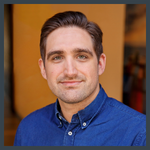
Communications Specialist, Alcohol Research Group, a program of the Public Health Institute
He completed a Master’s of Public Health at the University of San Francisco with a concentration in Community and Public Health Practice, and received his BA from Temple University in Communications. Using his background in film and graphic design, Dustin contributes to ARG’s dissemination and communication work to present research findings in a dynamic and accessible manner. In addition, he manages ARG’s library and provides research support to multiple grants and projects.

Biostatistician and Co-Director of the Statistics and Data Services Core, Alcohol Research Group, a program of the Public Health Institute
Dr. Li is a Biostatistician with extensive experience in causal inference, including causal mediation and moderation analyses, as well as in multilevel mediation analysis of neighborhood contextual influences on alcohol and substance use, alcohol use disorders, and other mental health behaviors. He currently serve as a Biostatistician on Dr. Mericle’s National Study of Treatment and Addiction Recovery Residences (NSTARR) project, for which he assisted in the development of sampling strategies for the national probability survey as well as the statistical approach.

Professor of Psychiatry, University of California, San Francisco (UCSF)
Her research focuses on understanding and addressing barriers to health promotion and health care access among individuals who use drugs. Using the principles of community-based participatory research, she has conducted studies of individual and system-level behavioral interventions to improve access to and the delivery of substance use disorder treatment, harm reduction services, and hepatitis C (HCV) health care services. These studies have been important in identifying effective strategies to link people who use drugs to HIV/HCV education and prevention interventions, opioid substitution therapy, and HCV evaluation and treatment. Dr. Masson has had a long-standing commitment to the training and development of early stage investigators, and has mentored undergraduate students, postdoctoral scholars, and assistant professors. Currently, she is the co-Director of the NIDA-funded Learning for Early Careers in Addiction and Diversity program at UCSF, a research training program that supports the career advancement of clinical scholars from underrepresented racial and ethnic groups working in the addictions field.

Scientist, Alcohol Research Group, a project of the Public Health Institute
Dr. Mericle is a health services researcher whose work focuses on highlighting the gaps in the substance use treatment delivery system and examining innovative approaches to increase access to and improve the quality and availability of substance use treatment and recovery support services. In addition to leading her own studies and collaborating with other scientists on theirs, she also serves on the PHI IRB and the Advisory Board for the National Alliance for Recovery Residences.

Senior Communications & Development Specialist, Alcohol Research Group, a program of the Public Health Institute.
As a freelance writer with a diverse background in filmmaking, graphic design, marketing, health care communications and epidemiology, Diane’s experience ranges from the operation of international educational programs to the promotion and implementation of patient-centered initiatives. In her current role, Diane leads ARG’s dissemination efforts to ensure research findings are presented in an accessible and digestible format that reaches diverse audiences. She is also responsible for planning, organizing, and managing development activities for the organization. She co-founded and operates a software company that builds cloud-based tools to assist health care organizations allocate resources for better health outcomes. She received her Masters of Science in Epidemiology and Health Care from the University of British Columbia.

Biostatistician, Public Health Institute
Dr. Subbaraman received her MS in statistics from Stanford University and PhD in epidemiology from UC Berkeley. Her research interests include causal inference; methods for studying mediators, moderators, and mechanisms of action; recovery from substance use disorders; treatment for alcohol use disorders; recovery housing; cannabis and alcohol policy; cannabis/alcohol substitution and complementarity; and policies related to substance use during pregnancy. Before joining Behavioral Health and Recovery Studies, she worked with the Alcohol Research Group for 14 years where she served as the Director of Statistical and Data Services for the last two.

Senior Scientist, Alcohol Research Group, a project of the Public Health Institute
She has an established record of research on diverse mutual-help groups including SMART Recovery, LifeRing Secular Recovery, and Women for Sobriety. She has also studied the utilization and efficacy of formal substance abuse treatment. She has been continually funded by NIH for 18 years, and has extensive experience with leading large NIH research grants.
Justice-Involved and Emerging Adult Populations

Jacqueline Bruce, a Research Scientist at OSLC, focuses her research on the impact of early adverse experiences, such as child maltreatment and multiple caregiver disruptions, on the development of young children. She is particularly interested in the development of behavioral regulation (or the ability to voluntarily regulate one’s behavior to meet the demands of the situation) and the underlying neural systems.

JEAP Initiative and Lighthouse Institute
Sierra Castedo de Martell is an Assistant Research Scientist with the JEAP Initiative and Chestnut Health Systems’ Lighthouse Institute. She is a person in long-term recovery from substance use disorder and her research focuses on economic evaluations of peer-driven substance use interventions, making economic evaluation information more accessible, and peer workforce development. She previously served as the director of a collegiate recovery program and serves as a board member for a local recovery community organization. She earned her PhD in public health behavioral sciences with a minor in health economics at the University of Texas Health Science Center at Houston School of Public Health in 2023.

University of Oregon, Prevention Science Institute (Research Assistant Professor) & Influents Innovations
Cioffi’s research focuses on improving health services and health outcomes among people with substance use disorders with a particular focus on highly stigmatized populations including people who are pregnant, postpartum, and parenting, experiencing houseless, and people who inject drugs. She is actively involved in efforts to improve equitable access to health services at the local and national level.

Dr. Gracelyn Cruden is a Research Scientist at the Oregon Social Learning Center. Her research leverages systems science, decision science, and implementation science to develop tools, processes, and partnerships to implement evidence-informed programs and policies. She collaborates with state and county-level policymakers, including through a NIMH career development award (K01) that engages states implementing the Family First Prevention Services Act. The K01 extends her work developing a multi-criteria decision analysis tool for supporting decision-making that leads to the adoption of interventions aligned with local values, local expertise, and scientific evidence.
In her role as a co-investigator on two NIDA HEAL-funded studies, she is leveraging qualitative and quantitative system dynamics modeling to inform the prevention adaptation of an evidence-based intervention for families referred to the child welfare system for parental substance use, and to inform cost analyses related to implementation of this intervention.

I have extensive experience in the criminal justice field through both employment and the conduct of research. In my long career with the Illinois Department of Corrections, DuPage County Probation, multiple local police departments, and Illinois police academies, and as director of a university-level criminal justice program, I contributed to the training of police officers, the education of undergraduate students pursuing work in the field of corrections, and an international body of knowledge that seeks to reimagine policing. Further, I served as a co-PI of a one-year study supported by the Illinois Criminal Justice Information Authority that investigated the reintegration experiences of men leaving prisons and returning to the Humboldt Park and Englewood communities of Chicago. This study contributed to the body of knowledge on the impacts of social capital on reintegration, as it identified those with fewer strong ties were more successful during reintegration because they were forced to access assistance outside their immediate social network. This work led to a published report for this organization.
I also led a two-year participant observation project examining the training of new recruits at two Illinois police academies, which was timely as it was on the heels of the Laquan McDonald case and many other publicized instances of aggressive police tactics. Findings confirmed that recruits are taught a racialized process of constructing some members of the community as criminals or unworthy victims to effectively police. This research contributed to the revisions of police academy training materials and the development of a new academy course on LGBTQIA+ Police Training and Allyship. This study also led to my ability to develop the first-of-its-kind certification program for students interested in working, and reimagining, the correctional system.
Combined, these opportunities have shaped my social justice investigatory lens and the solutions I propose to improve upon correctional systems, something evident in my invited publication for the International Activist Criminology Handbook. In 2021, I made a career shift from academia to a Research Scientist position at Chestnut Health Systems where I conduct applied behavioral health research and am also a JCOIN Hub Co-Investigator. This career shift has offered me the opportunity to delve deeper into my interests at the intersection of criminal justice and health, leading to the evaluation of several programs that focus on substance use, recovery residences, and medication-assisted treatment.

Tess Drazdowski, a licensed psychologist and Research Scientist at Chestnut Health Systems’ Lighthouse Institute, focuses her research and clinical work on groups experiencing disadvantage and under-resourced communities. Most recently, her research has concentrated on the prevention and intervention for the misuse of prescription drugs, cannabis use, and polysubstance use in primarily young adults. She is interested in investigating how to improve access to evidence-based practices for youth and young adults with substance use and mental health symptoms, particularly for those with justice system involvement.

Ryan E. Flinn is an Assistant Professor of Counseling Psychology at the University of North Dakota. They are an early career counseling psychologist whose research program aims to address the syndemic of trauma, substance use disorder, and criminal justice system involvement. They are specifically interested in studying recovery support services. Ryan identifies as a person with lived experience of the juvenile and criminal justice systems. Ryan is in long-term recovery from substance use disorder.
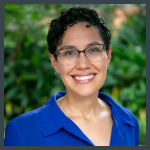
kathryn.r.gallardo@uth.tmc.edu
Kathryn Gallardo is an Assistant Professor at the University of Texas Health Science Center at Houston School of Public Health. She is a licensed master social worker and holds a PhD in Public Health with a specialization in Health Promotion and Behavioral Sciences. Her research interests center on examining, expanding, and enhancing access to recovery support services (RSS) for underserved and marginalized populations, including individuals taking medications for an opioid use disorder (MOUD) and emerging adults. She is particularly interested in exploring how MOUD-related stigma can be combatted within the context of RSS.

Angela Hagaman (DrPH, MA, NCC) is the Co-Director of the East Tennessee State University Addiction Science Center. In this role she provides leadership and support for the Center’s interdisciplinary research agenda and collaborates on a number of regional prevention and treatment initiatives. Dr. Hagaman currently serves as the Program Director for the NIDA-funded Studies to Advance Recovery Supports (STARS/R24DA051973), Co-investigator on the Collaborative Hub for Emerging Adult Recovery Research (CHEARR/R24DA057632), and Co-investigator for the CoARS supplement (Consortium on Addiction Recovery Science/R24DA051946). Dr. Hagaman also received formal mentoring and training through the Justice Involved and Emerging Adult Populations training institute (JEAP/R24DA051950).

Mike McCart, a Senior Research Scientist at OSLC, is a licensed clinical psychologist with specialized training in cognitive, behavioral, and family systems approaches to treating serious problems in adolescents and emerging adults. His research centers on enhancing behavioral health services for two high-risk populations: (1) adolescents and emerging adults with substance use and co-occurring behavior problems, and (2) victims of interpersonal violence.

Emily Pasman is a Postdoctoral Fellow at the University of Michigan Center for the Study of Drugs, Alcohol, Smoking and Health. She earned her PhD in Social Work from Wayne State University in May 2023. Her social work practice has centered around the development, implementation, and evaluation of peer-delivered services for people in or seeking recovery. Her current program of research aims to expand harm reduction interventions, improve peer-delivered services, and promote effective youth prevention and recovery support. Her research is informed by her lived experience in recovery, her background in peer recovery support services, and her academic and research training in harm reduction interventions.

Ashli Sheidow, a Senior Research Scientist at Chestnut Health Systems’ Lighthouse Institute, researches treatments for mental health and substance use problems in teens and emerging adults, particularly those who are involved in the justice system. She’s also focused on effective ways to get evidence-based practices into the “real world,” especially through improving training and support for community-based providers. While she does not have direct lived experience, she has indirect lived experience with substance use problems throughout multiple generations of her extended family that began with opiate addiction from laudanum prescribed postpartum to her great-grandmother.
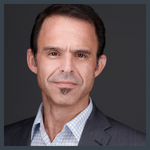
Paul Solomon is the Executive Director at Sponsors, Inc. in Eugene, Oregon. Since 1973, Sponsors has been providing reentry services to people with criminal histories. Mr. Solomon has worked at Sponsors for over 18 years and has served as Executive Director since 2011. The agency operates 20 buildings on 6 sites with over 240 beds of transitional and permanent housing and supportive programs for people with criminal histories. Mr. Solomon is dedicated to positive systemic change in the criminal justice system using research-based programs and interventions.

Martha Tillson, PhD is a recent doctoral graduate in Sociology at the University of Kentucky (Lexington, KY) and a research scientist at the University’s Center on Drug and Alcohol Research/Substance Use Priority Research Area. Her dissertation research centered on women’s gendered experiences of substance use/misuse and related risks (e.g., injection drug use), with a focus on factors and services that support women’s recovery/remission, particularly at community reentry post-incarceration. Currently, Dr. Tillson is supported by the Kentucky hub of the NIH/NIDA-funded Justice Community Opioid Innovation Network (JCOIN) national cooperative agreement (UG1DA050069, PI: Staton), which examines a pretreatment telehealth and peer navigation intervention for women with opioid use disorder (OUD) transitioning from jail to the community.
In addition to her role as a research scientist, she was also selected as an early-stage investigator trainee under the NIDA-funded Initiative for Justice and Emerging Adult Populations (JEAP; R24DA051950, PIs: Sheidow & McCart) to support researchers pursuing NIH funding focused on recovery support services. Dr. Tillson’s JEAP-funded pilot study is examining the role of peer recovery support specialists in addressing stigma related to medications for the treatment of OUD. Her work is motivated by her lived experience as a person in long-term recovery and her desire to reduce stigma and drug-related harms.

Dr. Byrne’s background is in cognitive neuroscience research that examines reward processing and habitual behavior. She applies this work to examine cognitive risk factors and outcomes associated with Substance Use Disorder. Additionally, she is interested in developing effective interventions for addiction and mental health. Currently, Dr. Byrne’s intervention-based work is focused on peer recovery coaching and mental health apps.

Dr. Claire Stam is a graduate of Furman University with a double major in Communication Studies and Spanish. She obtained her Master in Business Administration, Master in Public Administration, and PhD in Educational Leadership from Clemson University. Dr. Stam is Director of the Addiction Medicine Center at Prisma Health where she supports the development and execution of research and programmatic activity as it relates to addiction treatment, prevention, and recovery. She is the 2023-2024 President of the Junior League of Greenville, an organization of women committed to advancing women’s leadership for meaningful community impact through volunteer action, collaboration, and training. She leads the 1100+ member organization’s leadership activities and initiatives that help women in the Greenville community overcome barriers, focusing on human trafficking and economic mobility. She has served as a Host Committee Member for Switch’s Freedom Gala, Advisory Board Member for the Diaper Bank of the Carolinas, and Steering Committee Member for the SC Harm Reduction and Syringe Service Programs Symposium. She is a current Board Member for the Carolina Youth Symphony and was recognized by Greenville Business Magazine as one of the 2017 Best and Brightest 35 and Under.
Peer Recovery Innovation Network
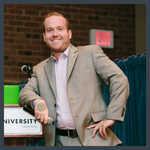
Assistant Professor, UT Health San Antonio
Dr. Ashford is a recovery scientist with a focus on recovery support services, as well as the executive director of Unity Recovery, a recovery community organization. Dr. Ashford joined UT Health San Antonio faculty in 2023. He serves as an Assistant Professor to the Department of Psychiatry and Behavioral Sciences.
With an extensive background in recovery-related research, he has developed a comprehensive understanding of opioid and other substance use disorder etiology and pathology, as well as the progression, mechanisms, and processes of recovery from these disorders. He has been particularly interested in the role of recovery support institutions (e.g., recovery community organizations, collegiate recovery programs) and recovery support services – including peer recovery support services – in the context of long-term individual recovery. His scientific research experience has exposed him to a range of theoretical backgrounds including psychology, social work, epidemiology, and ethnography.
As a master’s student in Dr. Brenda Curtis’s lab at the Perelman School of Medicine at the University of Pennsylvania, he examined the potential for social media data to predict public health alcohol use outcomes, as well as predictions of relapse risk rates among treatment-seeking populations.
Most recently, when completing his PhD, he has been focused on identifying novel forms of recovery support services, including digital recovery support services, and the ways in which these novel services can be deployed to populations with less access to in vivo supports or with a lower likelihood to engage in traditional supports. This topic was the focus of his dissertation and has resulted in a range of new research, notably the largest study to date on the delivery of peer recovery support services in the United States (Ashford et al., 2021).


Project Coordinator, UT Health San Antonio
Kierstyn serves as a project coordinator for the Peer Recovery Innovation Network (PRIN) at Be Well Texas. Her background in clinical trials as a research area specialist for investigative treatments of substance use disorders brings a unique perspective and skillset to recovery science. Passionate about creating healthier communities, she thrives in the intersection of public health and social impact. Her research interest includes interpersonal violence prevention and harm reduction methods for substance use disorders.
A proud UT Austin alum with a Bachelor of Science (BS) degree in public health, Kierstyn is continuing her education at the University of Texas Health Science Center Houston where she is pursuing a Master of Public Health (MPH) degree specializing in health promotion and behavioral sciences.
Kierstyn is dedicated to the mission of PRIN and looks forward to expanding the science of recovery through research on Peer Recovery Support Services (PRSS) and Recovery Support Services (RSS).

Program Manager – Recovery Support Services Specialist Co-I, UT Health San Antonio
Richard has spent the last 15 years working or serving the recovery community as it relates to Recovery Support Services (RSS), which includes Recovery Housing and serving as the vice-chair for the state of Texas Oxford House – Board of Directors (providers of recovery housing), Recovery Support Specialist in medically supervised sobering and detox centers, developed an In-House Recovery Program at Haven for Hope that housed 104 men and women, RSS and recovery housing program in San Antonio and across the State. Worked with the state of Texas Health and Human Services – Peer Services Unit in Austin. Currently, Richard is working with the Be Well Texas Program at UT Health San Antonio overseeing the development and delivery of recovery support services throughout Texas, with a focus on serving individuals and their families with criminal justice involvement and challenged with opioid and/or stimulant use disorders, development of recovery housing for emerging adults (18 – 25 yrs. of age), and expanding the capacity of peer services coupled with the addition of virtual behavioral health technology resources.
Richard enjoys all inside and outside activities that involve a ball, stick, hook, and/or mountain!

Postdoctoral Research Fellow, UT Health San Antonio
Dr. Jean-Berluche is a Postdoctoral Research Fellow for the Peer Recovery Innovation Network (PRIN) at UT Health San Antonio in the Department of Psychiatry and Behavioral Sciences, within the Long School of Medicine. He holds a Ph.D. in General Psychology. With an interdisciplinary approach, Dr. Jean-Berluche has explored the biological, psychological, and sociocultural underpinnings that influence positive changes associated with highly stressful events.
With a profound commitment to advancing the understanding of recovery processes, Dr. Jean-Berluche combines his academic expertise with a unique perspective as an individual in long-term recovery. His firsthand experience and scholarly expertise converge to drive innovation in the field of recovery science, shaping the infrastructure and insights essential for effective support and healing.

Director, Center for Substance Use Training and Telementoring, UT Health San Antonio
Dr. Lindsey presently serves as Assistant Professor at the University of Texas Health San Antonio, in the Department of Psychiatry and Behavioral Sciences, within the Long School of Medicine, as well as Director of the Center for Substance Use Training & Telementoring. She have previously served as Principal or Co-Principal Investigator on federal and state substance use disorder-related workforce development and training grants including a SAMHSA-funded SBIRT student training grant, a SAMHSA-funded buprenorphine waiver training grant (PCSS-Universities), and the State Opioid Response (SOR) and State Targeted Response (STR) initiatives, in partnership with a state Medicaid purveyor. Her areas of subject matter expertise include patient-centered communication techniques for SUD interventions, screening, brief intervention and referral to treatment (SBIRT), integrated behavioral healthcare, and medications for SUDs. Much of Dr. Lindsey’s professional work could be characterized as workforce development and dissemination in the interprofessional addictions space.

Vice President for Research, UT Health San Antonio
Dr. Potter is an accomplished addiction scientist with a large portfolio of NIH research and public health programs implementing evidence-based treatments statewide. Dr. Potter is a principal investigator with the NIDA Clinical Trials Network, and one of the PIs for the Peer Recovery Innovation Network (PRIN).
She joined the UT Health San Antonio faculty in 2008 after serving at Harvard Medical School and McLean Hospital in Belmont, Massachusetts. In 2012, she was promoted to assistant dean and then vice dean for research for the Joe R. and Teresa Lozano Long School of Medicine, where she served until June of 2021. Dr. Potter now serves as the Vice President for Research.
With funding from the Texas Health and Human Services Commission, Dr. Potter oversees several statewide, public health initiatives collectively known as Be Well Texas that expand access to compassionate, evidence-based treatment and care for substance use disorders (SUD) throughout Texas. The Be Well Texas portfolio includes: the Be Well Texas Clinic, a statewide, telehealth addiction medicine program; a statewide provider network that delivers SUD treatment and care in outpatient, hospital and community settings; clinical trials of innovative SUD treatments; and RecoveryTexas.org, a recovery-focused, web-based program that offers free, on-demand access to certified peer recovery support specialists.
Peer Recovery Support Services for Individuals in Recovery Residences on MOUD

mfishman@marylandtreatment.org
Dr Fishman is an addiction psychiatrist with extensive experience in clinical care of addiction patients, addiction research, and program development / administration in the real world. He leads Maryland Treatment Centers / Mountain Manor, a regional behavioral healthcare provider, which offers programs for residential and outpatient SUD and co-occurring treatment for youth and adults. He is a member of the psychiatry faculty at Johns Hopkins University School of Medicine. He has been a principal investigator on numerous research studies in addiction and published extensively in the field. His academic and research work has focused on addiction pharmacotherapy, particularly in OUD; models of care for youth; and treatment placement and matching strategies. He was a member of the Guideline Committee that developed the American Society of Addiction Medicine (ASAM) National Practice Guideline for the Treatment of OUD in 2015 and its update in 2020. He served as a co-editor for past editions of the ASAM Criteria for the Treatment of Substance-Related Disorders. He served as a past President of the Maryland Society of Addiction Medicine.

Kevin Wenzel, Ph.D., is Director of Research at Maryland Treatment Centers, a Maryland-based regional behavioral healthcare organization specializing in treatment for substance use disorder and co-occurring mental illness. He received his doctorate from Saint Louis University in 2016 and is a licensed psychologist. His research interests include identifying and developing effective treatments for addictions and related concerns with a special emphasis on cognitive behavioral approaches and family involvement to enhance treatment outcomes for opioid addiction in young people.
Recovery Research Institute

Dr. Kelly is the Elizabeth R. Spallin Professor of Psychiatry in Addiction Medicine at Harvard Medical School – the first endowed professor in addiction medicine at Harvard. He is also the Founder and Director of the Recovery Research Institute at the Massachusetts General Hospital (MGH) and the Associate Director of the Center for Addiction Medicine (CAM) at MGH. Dr. Kelly is a former President of the American Psychological Association’s (APA) Society of Addiction Psychology and is current President of the American Board of Addiction Psychology. He is also a Distinguished Fellow of the APA and has won numerous national and international lifetime achievement awards and distinguished scientist awards for his research and clinical work. He has served as a consultant to U.S. federal agencies and non-federal institutions, as well as foreign governments, the World Health Organization, and the United Nations. Dr. Kelly has published over 250 peer-reviewed articles, reviews, chapters, and books in the field of addiction medicine, and was an author on the U.S. Surgeon General’s Report on Alcohol, Drugs, and Health. His clinical and research work has focused on addiction treatment and the recovery process, mechanisms of behavior change, and reducing stigma and discrimination among individuals suffering from addiction.

zgerndt@mgh.harvard.edu
Zoe Gerndt is a Health Communications Manager at the Recovery Research Institute. She works primarily with communications for and about youth recovery. She graduated from the University of Michigan (go blue!), where she earned her Master of Public Health degree in Health Behavior and Health Education with a certificate in Public Health Genetics. She also attended the University of Michigan for her Bachelor’s degree in Biopsychology, Cognition, and Neuroscience.

zhall@mgh.harvard.edu
Zoe Hall is a Health Communications and Marketing Specialist at the Recovery Research Institute. She focuses on developing communications and marketing materials including the RRI Bulletin and our social media presence. Zoe graduated from the University of Maryland with a BA in Public Health Science. She has a specific interest in communicating complex research data in a way that is understandable and accessible to the general public.
Peer Recovery Support Services for Individuals in Recovery Residences on MOUD

mfishman@marylandtreatment.org
Dr Fishman is an addiction psychiatrist with extensive experience in clinical care of addiction patients, addiction research, and program development / administration in the real world. He leads Maryland Treatment Centers / Mountain Manor, a regional behavioral healthcare provider, which offers programs for residential and outpatient SUD and co-occurring treatment for youth and adults. He is a member of the psychiatry faculty at Johns Hopkins University School of Medicine. He has been a principal investigator on numerous research studies in addiction and published extensively in the field. His academic and research work has focused on addiction pharmacotherapy, particularly in OUD; models of care for youth; and treatment placement and matching strategies. He was a member of the Guideline Committee that developed the American Society of Addiction Medicine (ASAM) National Practice Guideline for the Treatment of OUD in 2015 and its update in 2020. He served as a co-editor for past editions of the ASAM Criteria for the Treatment of Substance-Related Disorders. He served as a past President of the Maryland Society of Addiction Medicine.

Kevin Wenzel, Ph.D., is Director of Research at Maryland Treatment Centers, a Maryland-based regional behavioral healthcare organization specializing in treatment for substance use disorder and co-occurring mental illness. He received his doctorate from Saint Louis University in 2016 and is a licensed psychologist. His research interests include identifying and developing effective treatments for addictions and related concerns with a special emphasis on cognitive behavioral approaches and family involvement to enhance treatment outcomes for opioid addiction in young people.
Studies to Advance Recovery Support

SBIRT Coordinator & STARS Peer Support Specialist Liaison
East Tennessee State University Addiction Science Center
I have 7 years of experience living with Co-Occurring Mental Health and Substance Use Disorders, however now I have over 6 years of experience in recovery and 4 years as a Certified Peer Recovery Support Specialist with numerous trainings and certifications.
With my extensive lived experience, I share my personal journey to inspire and give hope to others in need of recovery through my work and volunteerism and inform professionals who seek first-hand experience in their work. My unwavering dedication to promoting recovery in others not only fuels my own path to recovery and professional growth, but also drives my active participation in every opportunity for improvement.
I hold professional certifications as a Qualified Mental Health Professional (QMHP), Registered Peer Support Specialist (RPRS), and Certified Peer Recovery Support Specialist (CPRS) in Virginia, as well as a Peer Recovery Support Specialist (PRSS) in Tennessee.
I graduated with my B.S in Psychology from the University of Virginia’s college at Wise (UVA-Wise) in July 2013 and my Clinical Addiction Counseling Graduate Certificate from East Tennessee State University in July of 2022. I am currently a student in the Masters of Social Work (MSW) program at ETSU.
I have had the honor of being SBIRT Coordinator at the Addiction Science Center at ETSU since 2020 and a consult and liaison of the STARS Network with my lived experience since February of 2021. I have been a consult on several projects at the College of Public Health and participated in The Caring Workplace funded by First Tennessee Development District, The Stigma of Addiction among Pregnant and Postpartum Women for The Tennessee Department of Health, was featured in an article “Peer Recovery Support Specialists Promote Addiction Recovery Throughout Central Appalachia” in the Illuminated Journal and was acknowledged for my contributions to the U.S. Cooperative Extension’s Response to Substance Misuse: A Scoping Review, by Angela Hagaman, Kristen Roark & Lisa Tucker Washburn, published in Frontiers in Public Health, section Public Health Education and Promotion.
I actively pursue opportunities to advocate for recovery at various levels, including community, state, and national affiliations, advocacy boards, councils, and partnerships. I am committed to staying updated on innovative research and engaging in community services that contribute to the advancement of recovery initiatives.

Deputy Director and Research Scientist at the Virginia Tech Institute for Policy and Governance.
Mary Beth Dunkenberger specializes in research and technical assistance projects related to human service programs, policies, organizations, and systems. Her particular focus is on public policy and programs relating to human welfare, health, employment, and economic disparities. She has served as principal investigator or co-investigator on more than thirty sponsored research and technical assistance projects over the past fifteen years, collaborating with many community partners, faculty at Virginia Tech and other higher education institutions, and graduate students.
Over the past decade, much of Mary Beth’s work has focused on issues of substance use and addiction and how to support communities and community organizations to provide space and services to individuals and families in addressing addiction and substance use.

Angela Hagaman (DrPH, MA, NCC) is the Co-Director of the East Tennessee State University Addiction Science Center. In this role she provides leadership and support for the Center’s interdisciplinary research agenda and collaborates on a number of regional prevention and treatment initiatives. Dr. Hagaman currently serves as the Program Director for the NIDA-funded Studies to Advance Recovery Supports (STARS/R24DA051973), Co-investigator on the Collaborative Hub for Emerging Adult Recovery Research (CHEARR/R24DA057632), and Co-investigator for the CoARS supplement (Consortium on Addiction Recovery Science/R24DA051946). Dr. Hagaman also received formal mentoring and training through the Justice Involved and Emerging Adult Populations training institute (JEAP/R24DA051950).

Dr. Alexandra Hanlon is a Professor of Practice in the Department of Statistics at Virginia Tech, where she also directs the Center for Biostatistics and Health Data Science. Additionally, she co-directs Virginia Tech’s CTSA’s BERD Research Methods Core, which is a cross-state partnership among four institutions: UVA, VT, Inova and Carilion Clinic. She has worked as a collaborative biostatistician for over 30 years, serving as co-investigator on numerous funded studies within the areas of cancer, cardiovascular disease, obesity, sleep, gerontology, women’s health, and many more. She has served as a scientific reviewer for PCORI since its inception in 2012, and she also serves on various data safety monitoring committees. Dr. Hanlon is a Fellow of the American Statistical Association (ASA), and she currently serves on their Board of Directors.

Dr. Kimberly Horn, Ed.D is a scientist in the Virginia Tech Carilion Fralin Biomedical Research Institute and a research professor the Department of Population Health Sciences at Virginia Tech.
Arriving from George Washington University where she was the research dean in the School of Public Health, Dr. Horn is a nationally recognized research leader, scholar, and innovator. Dr. Horn has a diverse research funding portfolio from federal, state, and private agencies investigating tobacco and other substance use disorders.
Almost two decades of continuous federal funding has afforded her the opportunity to develop an internationally recognized program of research in youth and young adult tobacco control. A significant part of that program is the Not On Tobacco (N-O-T) teen smoking cessation program, which she co-developed during her time at West Virginia University, where she was a Professor of Community Medicine and Associate Director of the Mary Babb Randolph Cancer Center. N-O-T was formally adopted by the American Lung Association in 1998 and continues today across the US helping thousands of youth stop using tobacco. N-O-T is cited as the most widely used teen cessation program in the US, and received several national designations, including a Substance Abuse and Mental Health Administration Evidence-Based Model Program, a National Cancer Institute Research Tested Intervention Program, Centers for Disease Control and Prevention Adoptable Program, and an Office of Juvenile Justice and Delinquency Prevention Model Program. In keeping with Dr. Horn’s emphasis on collaborative innovation, she continues to grow her tobacco and other substance use research portfolio at Virginia Tech partnering with communities, major universities, and organizations across the US. Her continued impact on the field is evidenced by her new R01 grant from the National Institute on Minority Health Disparities to study the influences of race, ethnicity, and low SES on poly tobacco use and other health behaviors. Dr. Horn has a long history of community-engaged clinical outcomes research in Appalachia. Since arriving at VT in 2018, she is circling back to some of her early pivotal work in substance abuse prevention reinventing programs and spearheading innovations to address the opioid crisis in central Appalachia. Dr. Horn is the founding director of the Opioid Research Consortium of Central Appalachia (ORCCA), and PI of a new PCORI grant award to jump-start the ORCCA initiative.

Derek Kaknes earned his BS degree in Biomedical Engineering from the University of Virginia in 2009. He has subsequently held professional positions focusing on the development and delivery of statistical and computational analyses in industries from healthcare to financial services. Prior to joining CBHDS, Derek served as Vice President of Data Science Applications at Certilytics, Inc., a health analytics company that utilized terabyte-scale health claims data to generate patient-level predictions about clinical and financial outcomes. Derek has extensive experience with state-of-the-art data science and machine learning applications and technologies, including using R, Python, and MATLAB for statistical analyses, Apache Spark in Scala (Java) and Python for large scale data engineering, and TensorFlow for deep learning applications. When not at the office, Derek can be found (struggling) on the golf course and the soccer field or chasing his young daughter around the YMCA.

Lara Nagle works as the Community-Based Research Manager at the Virginia Tech Institute for Policy and Governance (VT-IPG), where she supports program evaluations for organizations at the local, regional and state level, including those in workforce development, public health, and housing. She also manages community-based research and engagement projects in Central Appalachia to assist stakeholders with strategic positioning and cross-sectoral partnership development. She brings more than ten years of professional and academic context working in, with, and for communities through environmental education, policy and advocacy, and cross-sectoral community development. Her research experience includes assessment of public health interventions, green infrastructure performance, mixed methods program evaluation, and study of the social, political, and economic dynamics impacting community change.

Robert Pack, PhD, MPH is Executive Vice Provost at East Tennessee State University (ETSU) and Professor of Community and Behavioral Health in the ETSU College of Public Health. He is Director of the ETSU Addiction Science Center, Director of the ETSU/NORC Rural Health Equity Research Center, and Co-Director of the Opioids Research Consortium of Central Appalachia (ORCCA). Funding for this work is generously granted from NIDA, HRSA, SAMHSA, PCORI and the Care Foundation of America. He serves as board chairman for the non-profit opioid treatment program Overmountain Recovery, board member for One Tennessee Health, on the Appalachian Regional Commission Substance Abuse Advisory Council, and has served as a Technical Expert for the Office of National Drug Control Policy. In 2019 he chaired the Association of Schools and Programs in Public Health (ASPPH) Task Force on Public Health Approaches to Control the Epidemic of Opioid Use Disorder; the Task Force reported on best practices for the use of future opioid settlement resources. He is a member of Class VIII of Leadership Tennessee.